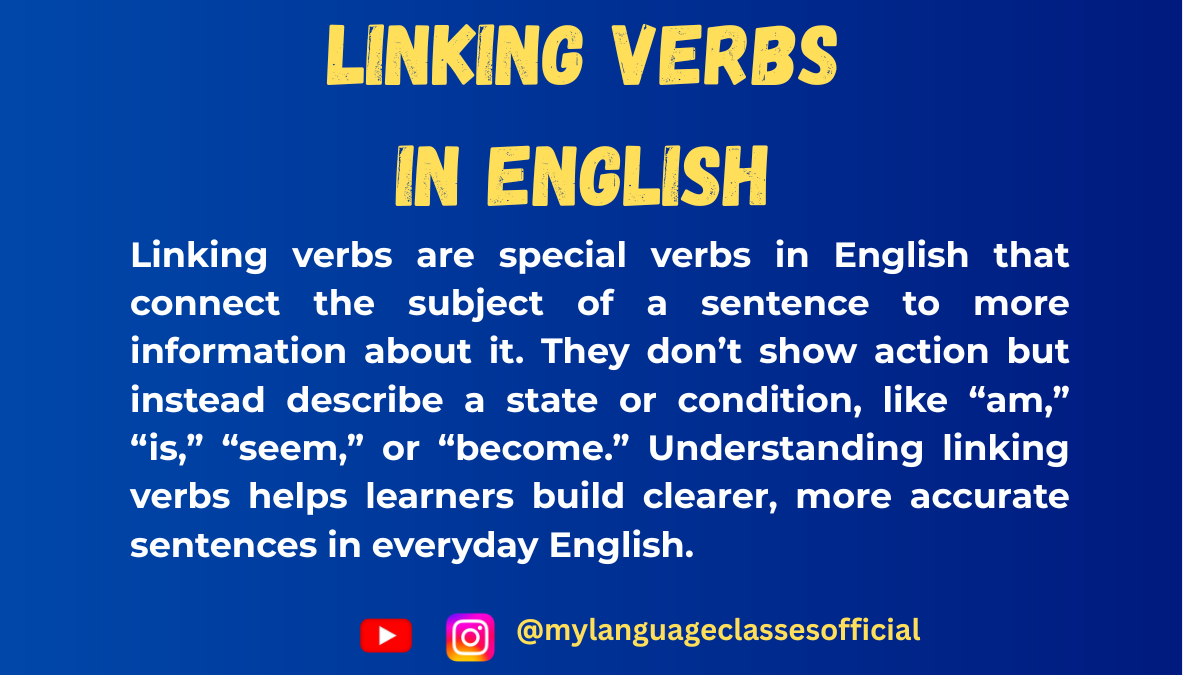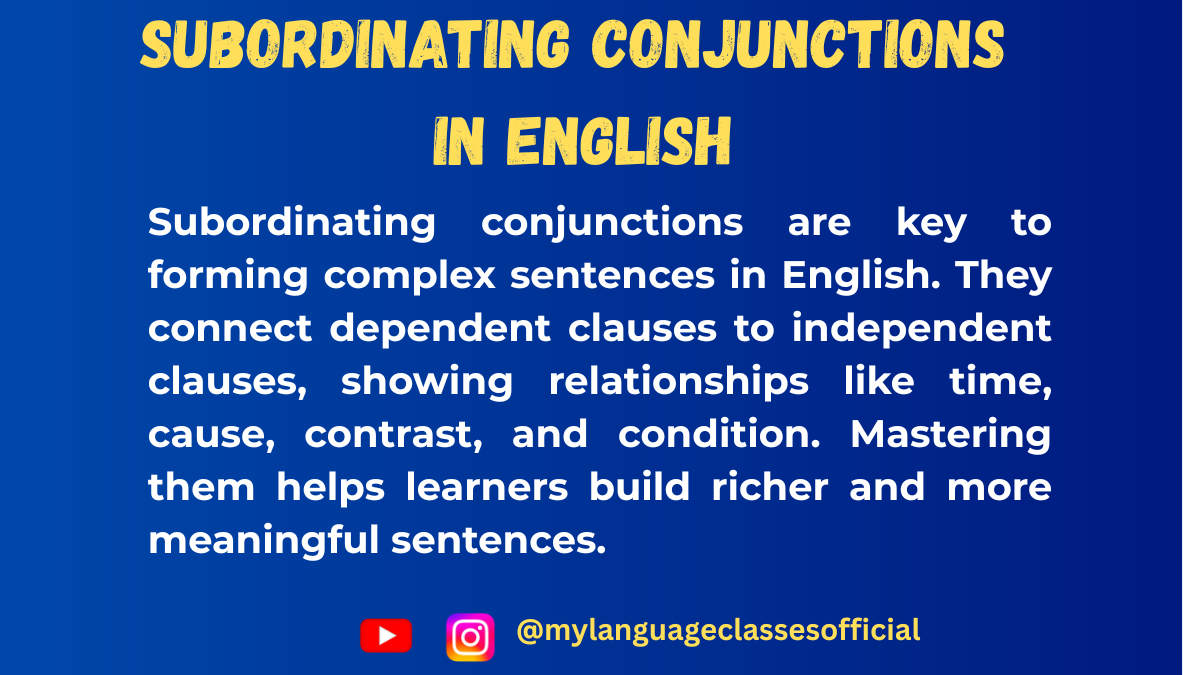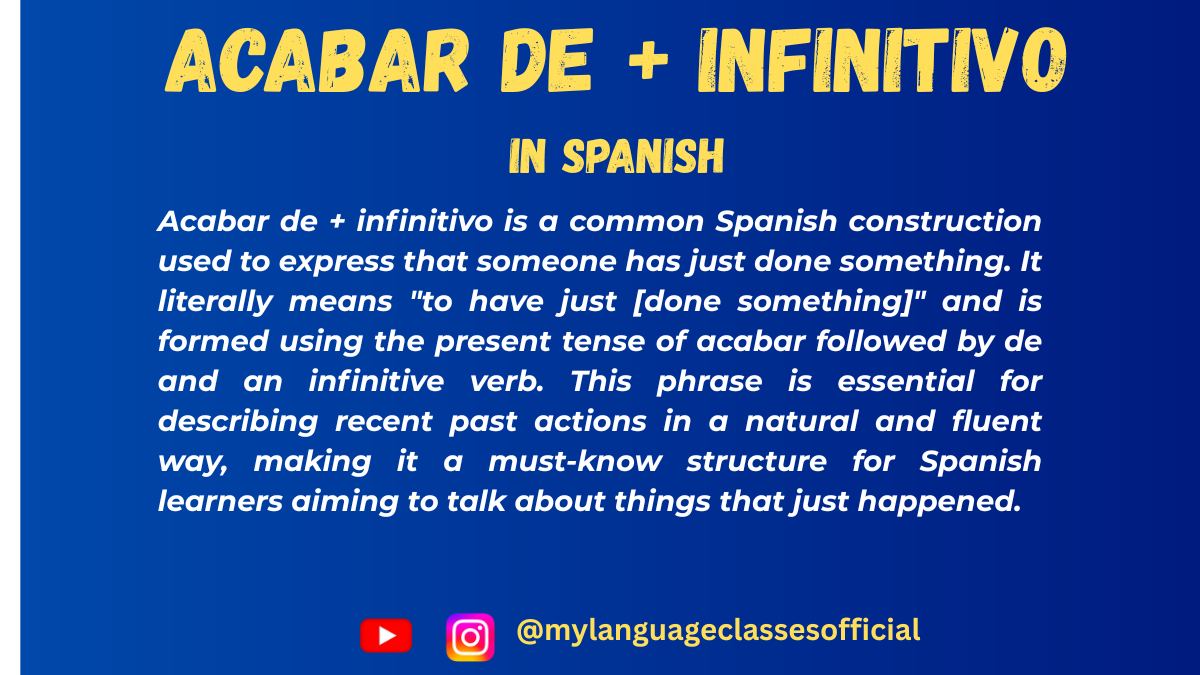Your cart is currently empty!
Tag: world of languages
-
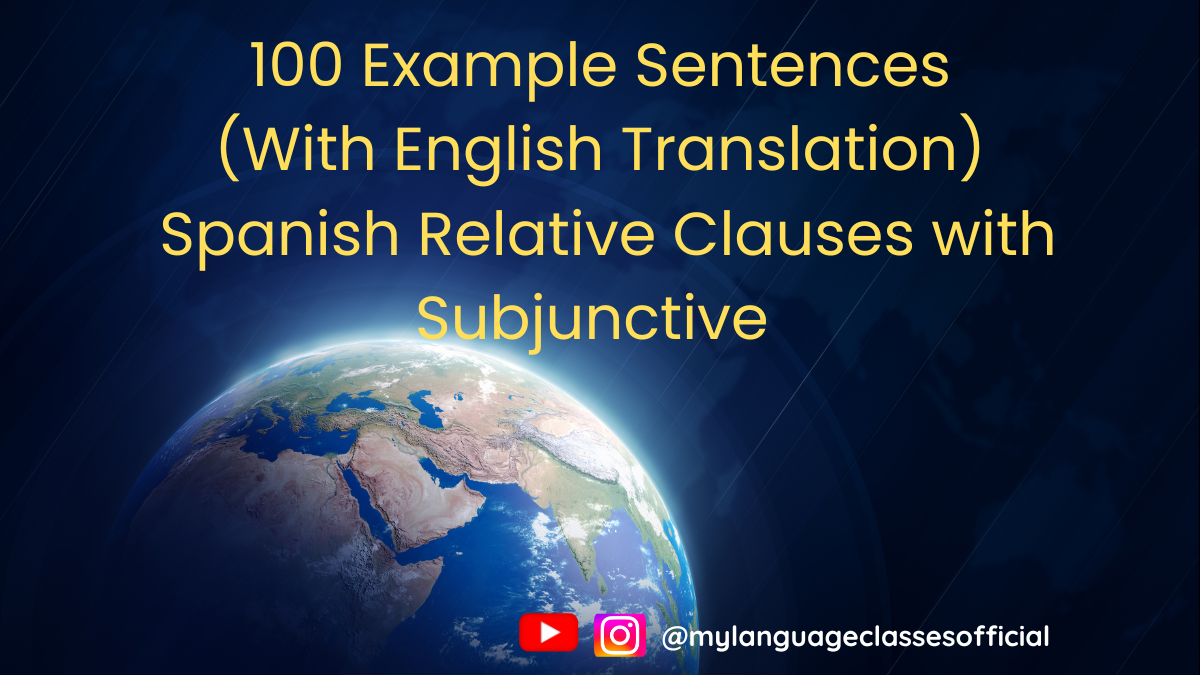
100 Example Sentences of Relative Clauses with Subjunctive in Spanish | My Language Classes
Relative Clauses with Subjunctive
Relative clauses with the subjunctive mood are a powerful tool in Spanish for expressing uncertainty, doubt, or hypothetical situations. They allow you to provide additional information about a noun in a way that feels natural and fluid. Whether you’re a beginner or an advanced learner, practicing example sentences is one of the best ways to master this grammatical structure.
In this blog post, we’ve compiled 100 example sentences of relative clauses with the subjunctive in Spanish to help you understand and practice this concept. Let’s dive in!
100 Example Sentences of Relative Clauses with Subjunctive
- Busco un libro que sea interesante. (I’m looking for a book that is interesting.)
- Necesito un coche que no gaste mucha gasolina. (I need a car that doesn’t use much gas.)
- Quiero un lugar donde pueda relajarme. (I want a place where I can relax.)
- No hay nadie que sepa la respuesta. (There’s no one who knows the answer.)
- Espero encontrar algo que me guste. (I hope to find something that I like.)
- Busco un profesor que hable español. (I’m looking for a teacher who speaks Spanish.)
- No conozco a nadie que haya estado allí. (I don’t know anyone who has been there.)
- Quiero un trabajo que me permita viajar. (I want a job that allows me to travel.)
- Necesito una solución que funcione. (I need a solution that works.)
- Es difícil encontrar a alguien que entienda esto. (It’s hard to find someone who understands this.)
- Busco un hotel que esté cerca de la playa. (I’m looking for a hotel that is near the beach.)
- Quiero un amigo que sea honesto. (I want a friend who is honest.)
- Necesito un teléfono que tenga buena cámara. (I need a phone that has a good camera.)
- No hay ningún restaurante que sirva comida vegana. (There’s no restaurant that serves vegan food.)
- Espero encontrar un lugar que sea tranquilo. (I hope to find a place that is quiet.)
- Busco un vestido que sea elegante. (I’m looking for a dress that is elegant.)
- Quiero un perro que sea cariñoso. (I want a dog that is affectionate.)
- Necesito una computadora que sea rápida. (I need a computer that is fast.)
- No conozco a nadie que haya leído ese libro. (I don’t know anyone who has read that book.)
- Busco un apartamento que tenga balcón. (I’m looking for an apartment that has a balcony.)
- Quiero un coche que sea seguro. (I want a car that is safe.)
- Necesito un médico que hable inglés. (I need a doctor who speaks English.)
- No hay ningún lugar donde pueda estudiar en paz. (There’s no place where I can study in peace.)
- Espero encontrar un trabajo que me haga feliz. (I hope to find a job that makes me happy.)
- Busco un libro que tenga ilustraciones. (I’m looking for a book that has illustrations.)
- Quiero un restaurante que sirva comida picante. (I want a restaurant that serves spicy food.)
- Necesito un parque donde pueda correr. (I need a park where I can run.)
- No hay nadie que pueda ayudarme. (There’s no one who can help me.)
- Busco un amigo que tenga intereses similares. (I’m looking for a friend who has similar interests.)
- Quiero una película que sea emocionante. (I want a movie that is exciting.)
- Necesito un profesor que explique bien. (I need a teacher who explains well.)
- No conozco a nadie que haya visto esa película. (I don’t know anyone who has seen that movie.)
- Busco un lugar donde pueda nadar. (I’m looking for a place where I can swim.)
- Quiero un teléfono que tenga buena batería. (I want a phone that has a good battery.)
- Necesito una silla que sea cómoda. (I need a chair that is comfortable.)
- No hay ningún libro que me interese. (There’s no book that interests me.)
- Espero encontrar un café que tenga buen Wi-Fi. (I hope to find a café that has good Wi-Fi.)
- Busco un coche que sea económico. (I’m looking for a car that is economical.)
- Quiero un trabajo que me permita ser creativo. (I want a job that allows me to be creative.)
- Necesito un lugar donde pueda trabajar en silencio. (I need a place where I can work in silence.)
- No hay nadie que quiera ayudarme. (There’s no one who wants to help me.)
- Busco un restaurante que tenga comida orgánica. (I’m looking for a restaurant that has organic food.)
- Quiero un libro que tenga un final inesperado. (I want a book that has an unexpected ending.)
- Necesito un amigo que me entienda. (I need a friend who understands me.)
- No conozco a nadie que haya estado en Japón. (I don’t know anyone who has been to Japan.)
- Espero encontrar un lugar que sea seguro. (I hope to find a place that is safe.)
- Busco un profesor que sea paciente. (I’m looking for a teacher who is patient.)
- Quiero un coche que tenga aire acondicionado. (I want a car that has air conditioning.)
- Necesito un teléfono que sea resistente al agua. (I need a phone that is waterproof.)
- No hay ningún lugar donde pueda descansar. (There’s no place where I can rest.)
- Busco un apartamento que tenga vista al mar. (I’m looking for an apartment that has a sea view.)
- Quiero un trabajo que me permita trabajar desde casa. (I want a job that allows me to work from home.)
- Necesito un libro que sea fácil de leer. (I need a book that is easy to read.)
- No hay nadie que pueda resolver este problema. (There’s no one who can solve this problem.)
- Espero encontrar un restaurante que tenga opciones vegetarianas. (I hope to find a restaurant that has vegetarian options.)
- Busco un amigo que sea divertido. (I’m looking for a friend who is fun.)
- Quiero un lugar donde pueda pasear a mi perro. (I want a place where I can walk my dog.)
- Necesito un médico que sea comprensivo. (I need a doctor who is understanding.)
- No conozco a nadie que haya escalado esa montaña. (I don’t know anyone who has climbed that mountain.)
- Busco un hotel que tenga piscina. (I’m looking for a hotel that has a pool.)
- Quiero un coche que sea espacioso. (I want a car that is spacious.)
- Necesito un profesor que sea amable. (I need a teacher who is kind.)
- No hay ningún lugar donde pueda bailar. (There’s no place where I can dance.)
- Espero encontrar un libro que me inspire. (I hope to find a book that inspires me.)
- Busco un restaurante que tenga música en vivo. (I’m looking for a restaurant that has live music.)
- Quiero un trabajo que me permita aprender. (I want a job that allows me to learn.)
- Necesito un lugar donde pueda meditar. (I need a place where I can meditate.)
- No hay nadie que pueda explicarme esto. (There’s no one who can explain this to me.)
- Busco un amigo que sea leal. (I’m looking for a friend who is loyal.)
- Quiero un teléfono que tenga buena memoria. (I want a phone that has good memory.)
- Necesito un coche que sea moderno. (I need a car that is modern.)
- No conozco a nadie que haya ganado ese premio. (I don’t know anyone who has won that award.)
- Espero encontrar un lugar que sea acogedor. (I hope to find a place that is cozy.)
- Busco un libro que tenga muchas ilustraciones. (I’m looking for a book that has many illustrations.)
- Quiero un restaurante que tenga terraza. (I want a restaurant that has a terrace.)
- Necesito un profesor que sea divertido. (I need a teacher who is fun.)
- No hay ningún lugar donde pueda pintar. (There’s no place where I can paint.)
- Busco un amigo que sea aventurero. (I’m looking for a friend who is adventurous.)
- Quiero un trabajo que me permita viajar por el mundo. (I want a job that allows me to travel the world.)
- Necesito un lugar donde pueda escribir. (I need a place where I can write.)
- No hay nadie que pueda cantar como tú. (There’s no one who can sing like you.)
- Busco un hotel que tenga gimnasio. (I’m looking for a hotel that has a gym.)
- Quiero un coche que sea ecológico. (I want a car that is eco-friendly.)
- Necesito un libro que tenga un mensaje profundo. (I need a book that has a deep message.)
- No conozco a nadie que haya visto un ovni. (I don’t know anyone who has seen a UFO.)
- Espero encontrar un lugar que sea romántico. (I hope to find a place that is romantic.)
- Busco un profesor que sea inspirador. (I’m looking for a teacher who is inspiring.)
- Quiero un restaurante que tenga comida casera. (I want a restaurant that has homemade food.)
- Necesito un teléfono que sea ligero. (I need a phone that is lightweight.)
- No hay ningún lugar donde pueda hacer yoga. (There’s no place where I can do yoga.)
- Busco un amigo que sea optimista. (I’m looking for a friend who is optimistic.)
- Quiero un trabajo que me permita ayudar a otros. (I want a job that allows me to help others.)
- Necesito un lugar donde pueda leer en paz. (I need a place where I can read in peace.)
- No hay nadie que pueda bailar como ella. (There’s no one who can dance like her.)
- Espero encontrar un libro que me haga reír. (I hope to find a book that makes me laugh.)
- Busco un coche que sea fácil de manejar. (I’m looking for a car that is easy to drive.)
- Quiero un profesor que sea motivador. (I want a teacher who is motivating.)
- Necesito un restaurante que tenga opciones sin gluten. (I need a restaurant that has gluten-free options.)
- No conozco a nadie que haya escrito un libro. (I don’t know anyone who has written a book.)
- Busco un lugar donde pueda ver las estrellas. (I’m looking for a place where I can see the stars.)
Conclusion
Practicing these 100 example sentences of relative clauses with the subjunctive in Spanish will help you become more comfortable with this essential grammar topic. Whether you’re describing hypothetical situations, expressing doubt, or seeking something specific, these sentences provide a solid foundation for mastering the subjunctive mood in relative clauses. Keep practicing, and soon you’ll be using these structures effortlessly in your conversations!
If you found this guide helpful, I’d love to hear from you! Share your thoughts in the comments below or connect with me on social media. For more tips, resources, and inspiration, visit my blog at mylanguageclassesblog.wordpress.com. Follow on Instagram and subscribe on YouTube
-
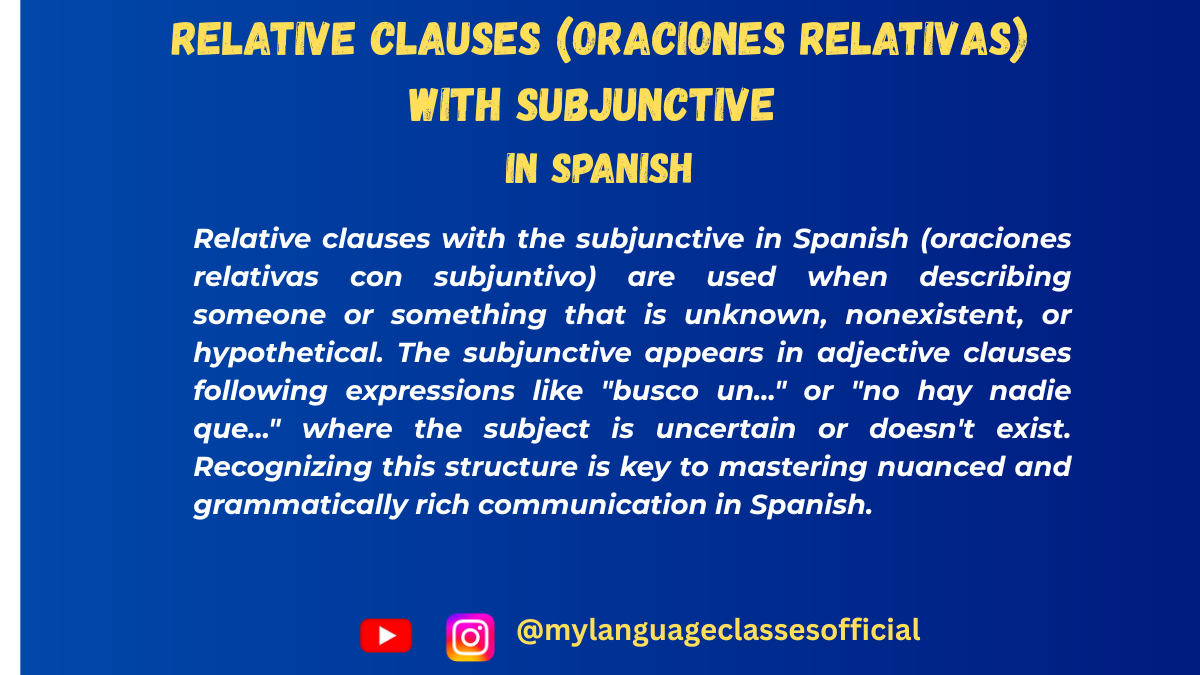
Relative Clauses(oraciones relativas) with Subjunctive in Spanish
Relative clauses, or oraciones relativas, are an essential part of Spanish grammar. They allow us to add extra information about a noun without starting a new sentence. When combined with the subjunctive mood, relative clauses take on a more nuanced meaning, often expressing uncertainty, doubt, or hypothetical situations. Mastering this structure is key to sounding more fluent and natural in Spanish.
In this blog post, we’ll explore everything you need to know about relative clauses with the subjunctive, including common expressions, conjugation rules, and practical examples.
Common Expressions Using Relative Clauses with Subjunctive
Here are some everyday expressions that use relative clauses with the subjunctive. These are frequently used in conversational Spanish:
- Busco a alguien que pueda ayudarme.
(I’m looking for someone who can help me.) - Necesito un libro que sea interesante.
(I need a book that is interesting.) - Quiero un lugar donde pueda relajarme.
(I want a place where I can relax.) - No hay nadie que sepa la respuesta.
(There’s no one who knows the answer.) - Espero encontrar algo que me guste.
(I hope to find something that I like.) - Busco un profesor que hable español.
(I’m looking for a teacher who speaks Spanish.) - No conozco a nadie que haya estado allí.
(I don’t know anyone who has been there.) - Quiero un coche que no gaste mucha gasolina.
(I want a car that doesn’t use much gas.) - Necesito una solución que funcione.
(I need a solution that works.) - Es difícil encontrar a alguien que entienda esto.
(It’s hard to find someone who understands this.)
Things to Keep in Mind
When using relative clauses with the subjunctive, there are a few key points to remember:
- Articles and Agreement: The definite (el, la, los, las) or indefinite (un, una, unos, unas) articles must agree in gender and number with the noun they modify.
Example: Busco una casa que tenga jardín. (I’m looking for a house that has a garden.) - Gender and Plurality: Adjectives and verbs within the relative clause must match the noun in gender and number.
Example: Necesito unos zapatos que sean cómodos. (I need shoes that are comfortable.) - Use of “Que”: The relative pronoun que is the most common connector in these clauses.
Example: Quiero un perro que sea tranquilo. (I want a dog that is calm.) - Indefinite or Non-Specific Nouns: The subjunctive is used when the noun is indefinite or not specific. If the noun is specific, the indicative is used instead.
Example: Subjunctive: Busco un libro que sea bueno. (I’m looking for a book that is good.)
Indicative: Este es el libro que es bueno. (This is the book that is good.) - Expressing Doubt or Uncertainty: The subjunctive is often used to express doubt, uncertainty, or hypothetical situations.
Example: No hay nadie que lo sepa. (There’s no one who knows it.)
When to Use Relative Clauses with Subjunctive
Relative clauses with the subjunctive are used in the following situations:
- When the Antecedent is Unknown or Non-Existent:
Example: Busco un médico que hable inglés. (I’m looking for a doctor who speaks English.) - When Expressing Doubt or Uncertainty:
Example: No creo que haya alguien que pueda hacerlo. (I don’t think there’s anyone who can do it.) - When the Antecedent is Indefinite:
Example: Necesito una casa que tenga tres habitaciones. (I need a house that has three bedrooms.) - When Making Hypothetical Statements:
Example: Quiero un trabajo que me permita viajar. (I want a job that allows me to travel.)
Conjugation of Regular Verbs in Relative Clauses with Subjunctive
To form the subjunctive in relative clauses, follow these steps for regular verbs:
1. -AR Verbs (e.g., hablar):
- yo: hable
- tú: hables
- él/ella/usted: hable
- nosotros/nosotras: hablemos
- vosotros/vosotras: habléis
- ellos/ellas/ustedes: hablen
2. -ER Verbs (e.g., comer):
- yo: coma
- tú: comas
- él/ella/usted: coma
- nosotros/nosotras: comamos
- vosotros/vosotras: comáis
- ellos/ellas/ustedes: coman
3. -IR Verbs (e.g., vivir):
- yo: viva
- tú: vivas
- él/ella/usted: viva
- nosotros/nosotras: vivamos
- vosotros/vosotras: viváis
- ellos/ellas/ustedes: vivan
Irregular Verbs and Their Conjugation
Here are some common irregular verbs in the subjunctive mood:
- Ser (to be):
- yo: sea
- tú: seas
- él/ella/usted: sea
- nosotros/nosotras: seamos
- vosotros/vosotras: seáis
- ellos/ellas/ustedes: sean
- Ir (to go):
- yo: vaya
- tú: vayas
- él/ella/usted: vaya
- nosotros/nosotras: vayamos
- vosotros/vosotras: vayáis
- ellos/ellas/ustedes: vayan
- Tener (to have):
- yo: tenga
- tú: tengas
- él/ella/usted: tenga
- nosotros/nosotras: tengamos
- vosotros/vosotras: tengáis
- ellos/ellas/ustedes: tengan
10 Regular Verbs in Relative Clauses with Subjunctive
Verb Subjunctive Form Example Sentence Meaning Hablar hable Busco alguien que hable francés. I’m looking for someone who speaks French. Comer coma Necesito un restaurante que coma vegano. I need a restaurant that serves vegan food. Vivir viva Quiero un lugar donde viva tranquilo. I want a place where I can live peacefully. Estudiar estudie Busco un profesor que estudie literatura. I’m looking for a teacher who studies lit. Trabajar trabaje Necesito un empleado que trabaje duro. I need an employee who works hard. Escuchar escuche Quiero una canción que escuche relajante. I want a song that sounds relaxing. Escribir escriba Busco un libro que escriba García Márquez. I’m looking for a book written by García Márquez. Leer lea Necesito un artículo que lea interesante. I need an article that reads interesting. Correr corra Quiero un parque donde corra seguro. I want a park where I can run safely. Cocinar cocine Busco un chef que cocine comida mexicana. I’m looking for a chef who cooks Mexican food.
More Example Sentences
- Espero encontrar un hotel que esté cerca de la playa.
(I hope to find a hotel that is near the beach.) - No hay nadie que quiera ayudarme.
(There’s no one who wants to help me.) - Quiero un vestido que sea elegante.
(I want a dress that is elegant.) - Busco un amigo que tenga intereses similares.
(I’m looking for a friend who has similar interests.) - Necesito un teléfono que funcione bien.
(I need a phone that works well.) - No conozco a nadie que haya viajado allí.
(I don’t know anyone who has traveled there.) - Quiero un trabajo que me permita ser creativo.
(I want a job that allows me to be creative.) - Es difícil encontrar un lugar que sea perfecto.
(It’s hard to find a place that is perfect.) - Busco una película que sea emocionante.
(I’m looking for a movie that is exciting.) - Necesito una solución que resuelva el problema.
(I need a solution that solves the problem.)
Fill in the Blanks
- Busco un libro que _____ (ser) interesante.
- Necesito un coche que no _____ (gastar) mucha gasolina.
- Quiero un lugar donde _____ (poder) relajarme.
- No hay nadie que _____ (saber) la respuesta.
- Espero encontrar algo que me _____ (gustar).
- Busco un profesor que _____ (hablar) español.
- No conozco a nadie que _____ (haber) estado allí.
- Quiero un trabajo que me _____ (permitir) viajar.
- Necesito una solución que _____ (funcionar).
- Es difícil encontrar a alguien que _____ (entender) esto.
Answers:
- sea
- gaste
- pueda
- sepa
- guste
- hable
- haya
- permita
- funcione
- entienda
Conclusion
Mastering relative clauses with the subjunctive in Spanish opens up a world of expressive possibilities. Whether you’re describing hypothetical situations, expressing doubt, or seeking something specific, this grammatical structure is indispensable. By practicing the conjugations, memorizing common expressions, and understanding the nuances, you’ll be well on your way to sounding like a native speaker. Keep practicing, and soon you’ll be using relative clauses with the subjunctive effortlessly in your conversations!
If you enjoyed this lesson, be sure to check out more posts like this on my blog at My Language Classes. Don’t forget to subscribe my YouTube channel and follow me on Instagram for the latest language learning tips and lessons. Leave a comment below to share your thoughts, or ask any questions you have about nouns.
Happy learning! 😊
- 100 Spanish Example Sentences
- 100 Spanish Fill-in-the-Blanks Exercises
- 100 Spanish Vocabulary Lists
- Spanish – Advanced
- Spanish – Beginner
- Spanish – Intermediate
- Busco a alguien que pueda ayudarme.
-

Best Time of Day to Learn a Language | My Language Classes
The Best Time of the Day to Study a Language for Maximum Retention
Learning a new language is an exciting journey, but it can also be challenging. One of the most common questions language learners ask is: When is the best time to study for maximum retention? The answer isn’t one-size-fits-all, but science and expert advice can help you find the perfect time to optimize your learning. In this blog post, we’ll explore the ideal times to study a language, backed by research, and provide practical tips to help you make the most of your study sessions.
Whether you’re a beginner or an advanced learner, understanding how your brain works and aligning your study schedule with your natural rhythms can make a world of difference. Let’s dive in!
Why Timing Matters in Language Learning
Your brain’s ability to absorb and retain information fluctuates throughout the day. Factors like focus, energy levels, and external distractions play a significant role in how effectively you learn. By studying at the right time, you can:
- Improve memory retention.
- Enhance focus and concentration.
- Make learning more enjoyable and less stressful.
So, when exactly is the best time to study a language? Let’s break it down.
The Science Behind Optimal Study Times
1. Morning: The Golden Hour for Learning
Research shows that mornings are ideal for cognitive tasks. After a good night’s sleep, your brain is refreshed and ready to absorb new information. Here’s why mornings work:
- Higher alertness: Your mind is clear, and distractions are minimal.
- Better memory retention: Studies suggest that information learned in the morning is more likely to be stored in long-term memory.
Pro Tip: Start your day with 20-30 minutes of language practice. Focus on vocabulary, grammar, or listening exercises to kickstart your brain.
2. Afternoon: A Balanced Approach
If mornings aren’t your thing, the afternoon can also be a productive time. By mid-day, your brain has warmed up, and you’re likely to be more creative.
- Ideal for interactive learning: Use this time for speaking practice, group classes, or language exchange sessions.
- Avoid the post-lunch slump: Schedule your study session before or after lunch to stay energized.
Pro Tip: Pair your afternoon study session with a cup of green tea or a short walk to boost focus.
3. Evening: Unwinding with Language
Evenings are perfect for relaxed, low-pressure learning. While your brain may not be as sharp as in the morning, evenings offer unique benefits:
- Reflection time: Review what you’ve learned during the day.
- Immersion opportunities: Watch a foreign movie, listen to a podcast, or read a book in your target language.
Pro Tip: Avoid cramming complex grammar rules at night. Instead, focus on enjoyable activities that reinforce what you’ve already learned.
How to Find Your Personal Best Time
While science provides general guidelines, everyone’s body clock is different. Here’s how to identify your optimal study time:
1. Track Your Energy Levels
Pay attention to when you feel most alert and focused during the day. Are you a morning person or a night owl? Use this insight to plan your study sessions.
2. Experiment with Different Times
Try studying at different times for a week and note how productive you feel. Keep a journal to track your progress and retention.
3. Align with Your Schedule
Choose a time that fits seamlessly into your daily routine. Consistency is key to building a sustainable language-learning habit.
Practical Tips for Maximizing Retention
1. Use Spaced Repetition
Spaced repetition is a proven technique for long-term retention. Tools like Anki or Quizlet can help you review vocabulary at optimal intervals.
2. Incorporate Active Learning
Engage with the language actively by speaking, writing, or teaching others. Passive learning (like listening) is great, but active practice solidifies your skills.
3. Take Breaks
Your brain needs time to process information. Follow the Pomodoro Technique: study for 25 minutes, then take a 5-minute break.
4. Stay Consistent
Even 15-20 minutes of daily practice is more effective than cramming for hours once a week.
Solutions to Common Problems
1. “I’m Too Tired to Study in the Morning.”
If mornings don’t work for you, don’t force it. Experiment with afternoon or evening sessions, but ensure you’re well-rested and focused.
2. “I Get Distracted Easily.”
Find a quiet, comfortable study space. Turn off notifications on your phone and use apps like Forest to stay focused.
3. “I Don’t Have Enough Time.”
Break your study sessions into smaller chunks. Even 10 minutes of focused practice can make a difference.
Conclusion: Timing Is Everything
Finding the best time to study a language can transform your learning experience. Whether you’re an early bird or a night owl, aligning your study schedule with your natural rhythms will help you retain more and enjoy the process. Remember, consistency and active engagement are just as important as timing.
Ready to Take Your Language Learning to the Next Level?
If you enjoyed this blog, be sure to check out more posts like this on my blog at My Language Classes. Don’t forget to subscribe my YouTube channel and follow me on Instagram for the latest language learning tips and lessons. Leave a comment below to share your thoughts, or ask any questions you have about nouns.
Happy learning! 😊
-
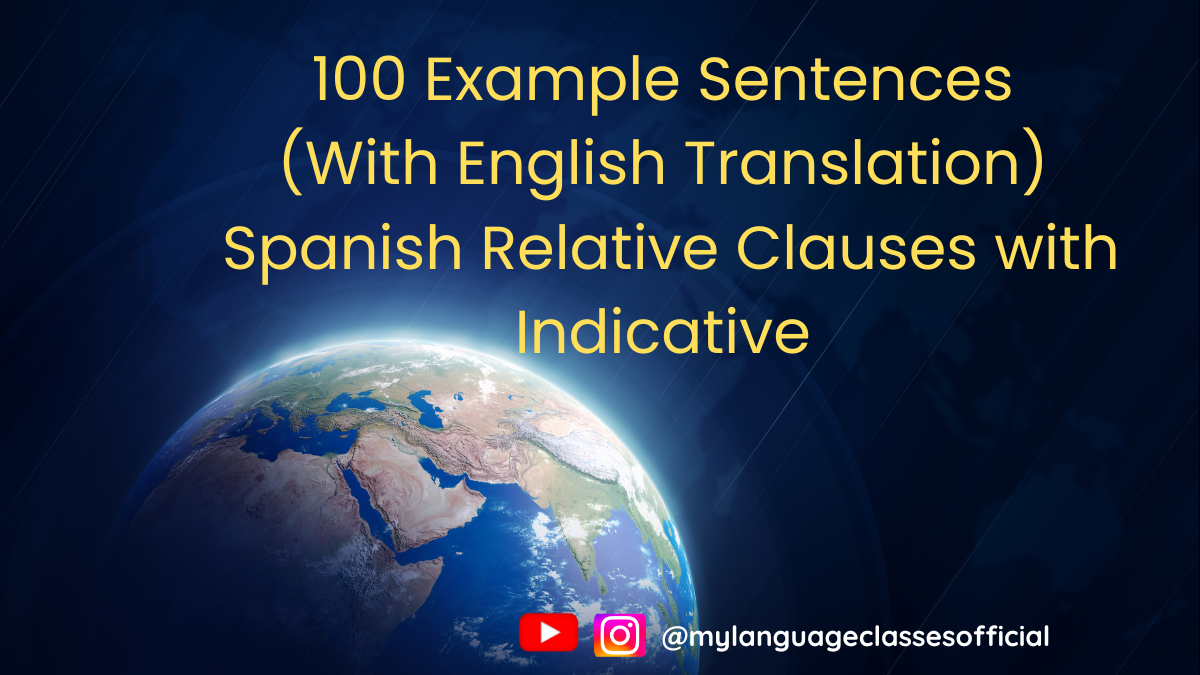
100 Example Sentences of Relative Clauses (Oraciones relativos) with Indicative in Spanish | My Language Classes
Relative Clauses (Oraciones relativos) with Indicative
Relative clauses, or oraciones relativos, are a fundamental part of Spanish grammar. They allow us to add extra information about a noun without starting a new sentence. When combined with the indicative mood, these clauses express factual or certain information. To help you master this concept, we’ve compiled 100 example sentences of relative clauses with the indicative in Spanish. These examples cover a wide range of everyday situations, making them perfect for practice and reference. Let’s dive in!
100 Example Sentences of Relative Clauses with Indicative
- El libro que leí es fascinante. (The book I read is fascinating.)
- La persona que me ayudó es muy amable. (The person who helped me is very kind.)
- El lugar donde vivimos es tranquilo. (The place where we live is peaceful.)
- El día que nos conocimos fue especial. (The day we met was special.)
- La razón por la que vine es importante. (The reason why I came is important.)
- Las cosas que me gustan son simples. (The things I like are simple.)
- El chico que sabe mucho es mi hermano. (The boy who knows a lot is my brother.)
- La casa que compramos es grande. (The house we bought is big.)
- El momento en que llegó fue inesperado. (The moment he/she arrived was unexpected.)
- La comida que preparé es saludable. (The food I prepared is healthy.)
- El coche que conduzco es nuevo. (The car I drive is new.)
- La película que vimos fue emocionante. (The movie we watched was exciting.)
- El profesor que enseña español es muy bueno. (The teacher who teaches Spanish is very good.)
- La ciudad donde nací es hermosa. (The city where I was born is beautiful.)
- El regalo que recibí es perfecto. (The gift I received is perfect.)
- Las flores que compraste son hermosas. (The flowers you bought are beautiful.)
- El niño que juega en el parque es mi hijo. (The boy who plays in the park is my son.)
- La música que escucho es relajante. (The music I listen to is relaxing.)
- El restaurante que recomendaste es excelente. (The restaurant you recommended is excellent.)
- La persona que llamó es mi jefe. (The person who called is my boss.)
- El libro que escribió es famoso. (The book he/she wrote is famous.)
- La playa donde nadamos es tranquila. (The beach where we swim is peaceful.)
- El día que llegaste fue inolvidable. (The day you arrived was unforgettable.)
- La razón por la que estudias es admirable. (The reason why you study is admirable.)
- Las canciones que cantamos son divertidas. (The songs we sing are fun.)
- El hombre que habla es mi profesor. (The man who is speaking is my teacher.)
- La mujer que cocina es mi madre. (The woman who cooks is my mother.)
- El perro que ladra es de mi vecino. (The dog that is barking is my neighbor’s.)
- La casa que construyeron es enorme. (The house they built is huge.)
- El café que tomamos es delicioso. (The coffee we drank is delicious.)
- El chico que corre rápido ganó la carrera. (The boy who runs fast won the race.)
- La película que vimos ayer fue aburrida. (The movie we watched yesterday was boring.)
- El lugar donde nos encontramos es muy popular. (The place where we met is very popular.)
- El libro que estoy leyendo es interesante. (The book I’m reading is interesting.)
- La persona que me llamó es mi mejor amigo. (The person who called me is my best friend.)
- El coche que compraste es muy rápido. (The car you bought is very fast.)
- La comida que pedimos estaba fría. (The food we ordered was cold.)
- El niño que estudia mucho es muy inteligente. (The boy who studies a lot is very smart.)
- La ciudad que visitamos es muy antigua. (The city we visited is very old.)
- El momento en que nos conocimos fue mágico. (The moment we met was magical.)
- El libro que me prestaste es increíble. (The book you lent me is amazing.)
- La persona que canta es mi hermana. (The person who is singing is my sister.)
- El lugar donde trabajamos es muy moderno. (The place where we work is very modern.)
- El día que llegamos fue lluvioso. (The day we arrived was rainy.)
- La razón por la que no vine es el tráfico. (The reason I didn’t come is the traffic.)
- Las cosas que compramos son útiles. (The things we bought are useful.)
- El chico que juega fútbol es mi primo. (The boy who plays soccer is my cousin.)
- La casa que alquilamos es pequeña. (The house we rented is small.)
- El momento en que ganamos fue emocionante. (The moment we won was exciting.)
- La comida que preparaste está deliciosa. (The food you prepared is delicious.)
- El coche que vendimos era viejo. (The car we sold was old.)
- La película que recomendaste es muy buena. (The movie you recommended is very good.)
- El profesor que nos enseñó es muy sabio. (The teacher who taught us is very wise.)
- La ciudad donde crecí es muy pequeña. (The city where I grew up is very small.)
- El regalo que hiciste es muy especial. (The gift you made is very special.)
- Las flores que plantamos están creciendo. (The flowers we planted are growing.)
- El niño que dibuja es muy talentoso. (The boy who draws is very talented.)
- La música que tocamos es clásica. (The music we play is classical.)
- El restaurante que elegimos es caro. (The restaurant we chose is expensive.)
- La persona que me escribió es mi amiga. (The person who wrote to me is my friend.)
- El libro que leíste es muy interesante. (The book you read is very interesting.)
- La playa donde descansamos es hermosa. (The beach where we rested is beautiful.)
- El día que nos casamos fue perfecto. (The day we got married was perfect.)
- La razón por la que trabajas es importante. (The reason why you work is important.)
- Las canciones que escuchamos son románticas. (The songs we listen to are romantic.)
- El hombre que corre es mi vecino. (The man who is running is my neighbor.)
- La mujer que pinta es muy talentosa. (The woman who paints is very talented.)
- El perro que adoptamos es muy cariñoso. (The dog we adopted is very affectionate.)
- La casa que diseñamos es única. (The house we designed is unique.)
- El café que bebimos es fuerte. (The coffee we drank is strong.)
- El chico que estudia medicina es mi amigo. (The boy who studies medicine is my friend.)
- La película que vimos anoche fue divertida. (The movie we watched last night was fun.)
- El lugar donde cenamos es muy acogedor. (The place where we had dinner is very cozy.)
- El libro que compré es muy educativo. (The book I bought is very educational.)
- La persona que me espera es mi novia. (The person waiting for me is my girlfriend.)
- El coche que manejas es muy moderno. (The car you drive is very modern.)
- La comida que cocinaste es exquisita. (The food you cooked is exquisite.)
- El niño que lee mucho es muy listo. (The boy who reads a lot is very clever.)
- La ciudad que exploramos es fascinante. (The city we explored is fascinating.)
- El momento en que nos graduamos fue emotivo. (The moment we graduated was emotional.)
- El libro que me regalaste es muy útil. (The book you gave me is very useful.)
- La persona que baila es mi prima. (The person who is dancing is my cousin.)
- El lugar donde nos relajamos es tranquilo. (The place where we relax is peaceful.)
- El día que viajamos fue soleado. (The day we traveled was sunny.)
- La razón por la que luchas es admirable. (The reason why you fight is admirable.)
- Las cosas que aprendimos son valiosas. (The things we learned are valuable.)
- El chico que juega baloncesto es mi compañero. (The boy who plays basketball is my teammate.)
- La casa que construimos es ecológica. (The house we built is eco-friendly.)
- El momento en que ganamos fue inolvidable. (The moment we won was unforgettable.)
- La comida que probamos fue picante. (The food we tried was spicy.)
- El coche que arreglamos funciona bien. (The car we fixed works well.)
- La película que disfrutamos fue emocionante. (The movie we enjoyed was exciting.)
- El profesor que nos guió es muy paciente. (The teacher who guided us is very patient.)
- La ciudad donde nos conocimos es muy animada. (The city where we met is very lively.)
- El regalo que recibimos fue sorprendente. (The gift we received was surprising.)
- Las flores que cortamos son frescas. (The flowers we cut are fresh.)
- El niño que canta es muy talentoso. (The boy who sings is very talented.)
- La música que escuchamos es alegre. (The music we listen to is cheerful.)
- El restaurante que visitamos es muy famoso. (The restaurant we visited is very famous.)
- La persona que me inspiró es mi abuela. (The person who inspired me is my grandmother.)
Conclusion
These 100 example sentences of relative clauses with the indicative in Spanish are designed to help you understand and practice this important grammar concept. By studying these examples, you’ll gain confidence in constructing your own sentences and using relative clauses naturally in conversations. Keep practicing, and soon you’ll master this essential part of Spanish grammar. ¡Buena suerte! (Good luck!)
If you found this guide helpful, I’d love to hear from you! Share your thoughts in the comments below or connect with me on social media. For more tips, resources, and inspiration, visit my blog at mylanguageclassesblog.wordpress.com. Follow on Instagram and subscribe on YouTube
-
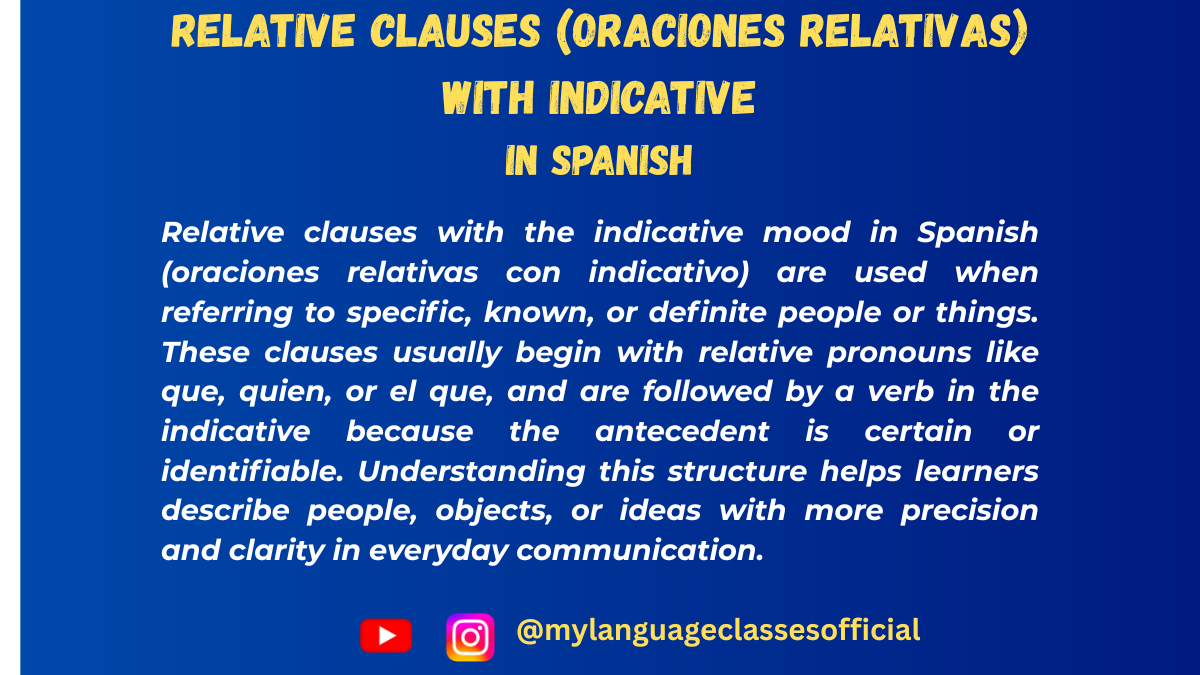
Relative Clauses (Oraciones relativas) with Indicative in Spanish
Relative clauses, or oraciones relativos, are an essential part of Spanish grammar. They allow us to provide additional information about a noun without starting a new sentence. When combined with the indicative mood, relative clauses are used to express factual or certain information. Understanding how to use them correctly can significantly improve your fluency and comprehension in Spanish.
In this blog post, we’ll explore everything you need to know about relative clauses with the indicative mood, including common expressions, conjugation rules, and practical examples.
Common Expressions Using Relative Clauses with Indicative
Here’s a list of common expressions that use relative clauses with the indicative mood in everyday Spanish:
- El libro que leí – The book that I read.
- La persona que me ayudó – The person who helped me.
- El lugar donde vivimos – The place where we live.
- El momento en que llegó – The moment when he/she arrived.
- La razón por la que vine – The reason why I came.
- Las cosas que me gustan – The things that I like.
- El chico que sabe mucho – The boy who knows a lot.
- La casa que compramos – The house that we bought.
- El día que nos conocimos – The day we met.
- La comida que preparé – The food that I prepared.
These expressions are widely used in daily conversations and are a great starting point for mastering relative clauses with the indicative.
Things to Keep in Mind
When using relative clauses with the indicative mood, keep the following points in mind:
- Articles and Agreement: The relative pronoun (que, quien, donde, etc.) must agree in number and gender with the noun it refers to. For example:
- El hombre que habla (The man who speaks).
- Las mujeres que cantan (The women who sing).
- Indicative Mood: The indicative is used when the information in the relative clause is factual or certain. For example:
- El niño que estudia mucho (The boy who studies a lot).
- Relative Pronouns:
- Que is the most common relative pronoun and can refer to people, things, or ideas.
- Quien/quienes is used for people, especially after prepositions.
- Donde refers to places.
- El cual/la cual/los cuales/las cuales are more formal and used to avoid ambiguity.
- Prepositions: When a preposition is needed, it is placed before the relative pronoun. For example:
- La chica con la que hablé (The girl I spoke with).
When to Use Relative Clauses with Indicative
Relative clauses with the indicative mood are used in the following situations:
- To Provide Specific Information:
- El coche que compré es rojo (The car I bought is red).
- To Describe People or Things:
- La profesora que enseña español es muy amable (The teacher who teaches Spanish is very kind).
- To Indicate Time or Place:
- El día que llegaste fue especial (The day you arrived was special).
- To Explain Reasons:
- La razón por la que no vine es el tráfico (The reason I didn’t come is the traffic).
Conjugation of Regular Verbs
To form relative clauses with the indicative, conjugate the verb in the indicative mood according to the subject. Here’s how to conjugate regular verbs:
1. -AR Verbs (e.g., hablar – to speak):
- Yo hablo
- Tú hablas
- Él/Ella/Usted habla
- Nosotros/Nosotras hablamos
- Vosotros/Vosotras habláis
- Ellos/Ellas/Ustedes hablan
2. -ER Verbs (e.g., comer – to eat):
- Yo como
- Tú comes
- Él/Ella/Usted come
- Nosotros/Nosotras comemos
- Vosotros/Vosotras coméis
- Ellos/Ellas/Ustedes comen
3. -IR Verbs (e.g., vivir – to live):
- Yo vivo
- Tú vives
- Él/Ella/Usted vive
- Nosotros/Nosotras vivimos
- Vosotros/Vosotras vivís
- Ellos/Ellas/Ustedes viven
Irregular Verbs and Their Conjugation
Here are some common irregular verbs and their conjugation in the indicative mood:
- Ser (to be):
- Yo soy
- Tú eres
- Él/Ella/Usted es
- Nosotros/Nosotras somos
- Vosotros/Vosotras sois
- Ellos/Ellas/Ustedes son
- Ir (to go):
- Yo voy
- Tú vas
- Él/Ella/Usted va
- Nosotros/Nosotras vamos
- Vosotros/Vosotras vais
- Ellos/Ellas/Ustedes van
- Tener (to have):
- Yo tengo
- Tú tienes
- Él/Ella/Usted tiene
- Nosotros/Nosotras tenemos
- Vosotros/Vosotras tenéis
- Ellos/Ellas/Ustedes tienen
10 Regular Verbs in Relative Clauses with Indicative
Verb Example Sentence 1 Example Sentence 2 Hablar El hombre que habla es mi profesor. La mujer que habla español es mi amiga. Comer El niño que come fruta está sano. La comida que comimos fue deliciosa. Vivir La ciudad donde vivo es muy bonita. Las personas que viven aquí son amables. Escuchar La música que escucho es relajante. El chico que escucha música es mi hermano. Escribir El libro que escribió es famoso. Las cartas que escribimos son importantes. Leer El artículo que leí es interesante. Los libros que leemos son educativos. Correr El atleta que corre rápido ganó la carrera. El perro que corre en el parque es mío. Bailar La chica que baila es mi hermana. La música que bailamos es salsa. Cantar El cantante que canta bien es famoso. Las canciones que cantamos son divertidas. Trabajar El hombre que trabaja aquí es ingeniero. La empresa donde trabajamos es grande.
More Example Sentences
- El coche que conduzco es nuevo. (The car I drive is new.)
- La casa que construyeron es enorme. (The house they built is huge.)
- El libro que leíste es interesante. (The book you read is interesting.)
- El lugar donde nos conocimos es especial. (The place where we met is special.)
- La persona que me llamó es mi jefe. (The person who called me is my boss.)
- El día que llegaste fue inolvidable. (The day you arrived was unforgettable.)
- La razón por la que estudias es importante. (The reason why you study is important.)
- Las flores que compraste son hermosas. (The flowers you bought are beautiful.)
- El niño que juega en el parque es mi hijo. (The boy who plays in the park is my son.)
- La comida que preparaste está deliciosa. (The food you prepared is delicious.)
Fill in the Blanks
- El libro ___ leí es muy interesante.
- La persona ___ me ayudó es mi amiga.
- El lugar ___ vivimos es tranquilo.
- El día ___ nos conocimos fue especial.
- La razón ___ vine es importante.
- Las cosas ___ me gustan son simples.
- El chico ___ sabe mucho es mi hermano.
- La casa ___ compramos es grande.
- El momento ___ llegó fue inesperado.
- La comida ___ preparé es saludable.
Answers: 1. que, 2. que, 3. donde, 4. que, 5. por la que, 6. que, 7. que, 8. que, 9. en que, 10. que
Conclusion
Mastering relative clauses with the indicative mood in Spanish is a key step toward fluency. By understanding the rules, practicing conjugation, and using common expressions, you’ll be able to communicate more effectively and naturally. Keep practicing with the examples and exercises provided, and soon you’ll find yourself using relative clauses with confidence in your conversations.
¡Buena suerte! (Good luck!)
If you enjoyed this lesson, be sure to check out more posts like this on my blog at My Language Classes. Don’t forget to subscribe my YouTube channel and follow me on Instagram for the latest language learning tips and lessons. Leave a comment below to share your thoughts, or ask any questions you have about nouns.
Happy learning! 😊
- 100 Spanish Example Sentences
- 100 Spanish Fill-in-the-Blanks Exercises
- 100 Spanish Vocabulary Lists
- Spanish – Advanced
- Spanish – Beginner
- Spanish – Intermediate
-
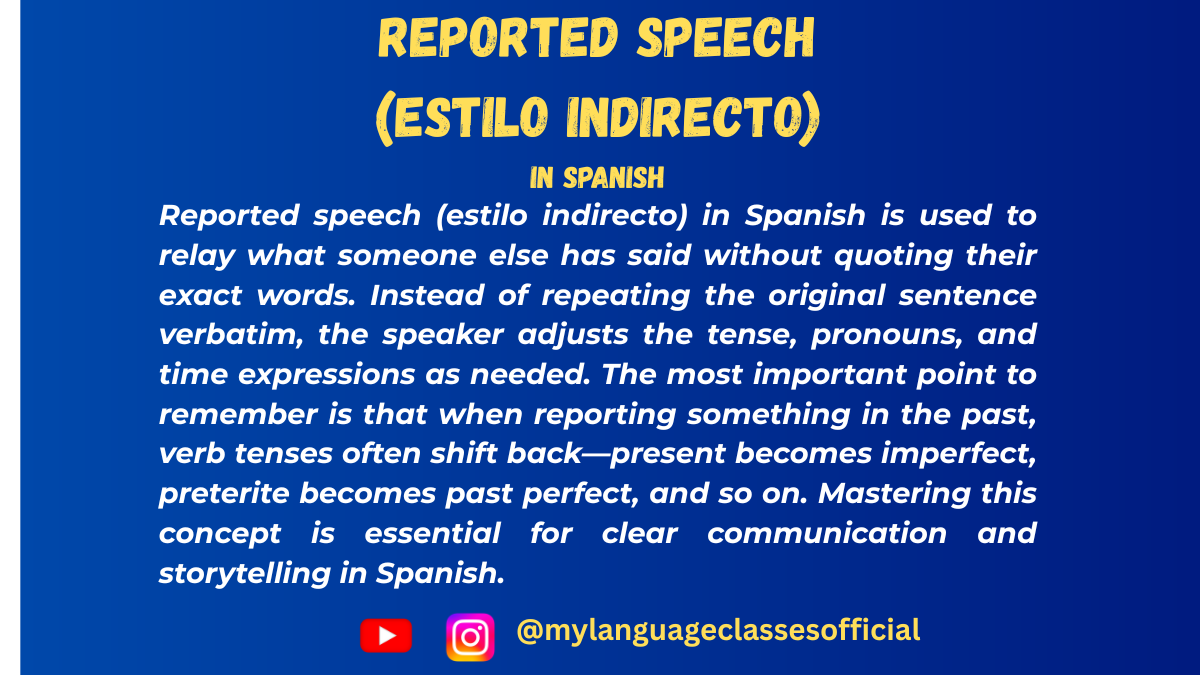
Reported Speech (Estilo Indirecto) in Spanish
Reported speech, or estilo indirecto, is a fundamental aspect of Spanish grammar that allows us to relay what someone else has said without quoting their exact words. It is used in both formal and informal contexts, making it an essential skill for effective communication in Spanish. Whether you’re recounting a conversation, sharing news, or summarizing someone’s thoughts, mastering estilo indirecto will significantly enhance your fluency.
In this blog post, we’ll explore everything you need to know about estilo indirecto, including common expressions, conjugation rules, irregular verbs, and practical examples. By the end, you’ll have a solid understanding of how to use reported speech confidently in Spanish.
Common Expressions Using Estilo Indirecto
Here’s a list of common expressions used in daily life with estilo indirecto. These phrases are frequently used to report speech or thoughts:
- Dijo que… – He/She said that…
- Me preguntó si… – He/She asked me if…
- Quería saber si… – He/She wanted to know if…
- Explicó que… – He/She explained that…
- Comentó que… – He/She commented that…
- Aseguró que… – He/She assured that…
- Negó que… – He/She denied that…
- Prometió que… – He/She promised that…
- Sugirió que… – He/She suggested that…
- Advirtió que… – He/She warned that…
These expressions are often followed by a verb in the indicative or subjunctive mood, depending on the context.
Things to Keep in Mind
When using estilo indirecto, there are several key points to remember:
- Verb Tense Changes: The tense of the verb in the original statement often changes in reported speech. For example, present tense may shift to imperfect, and preterite may shift to pluperfect.
- Pronoun Adjustments: Pronouns often change to reflect the new perspective. For example, yo (I) may become él/ella (he/she).
- Time and Place References: Words like hoy (today) may change to aquel día (that day) in reported speech.
- Use of Que: The word que (that) is frequently used to introduce reported speech.
- Subjunctive Mood: If the original statement expresses doubt, uncertainty, or a recommendation, the subjunctive mood is used in estilo indirecto.
- Gender and Number Agreement: Ensure that adjectives and articles agree in gender and number with the nouns they modify.
When to Use Estilo Indirecto
Estilo indirecto is used in the following situations:
- Reporting Statements: To relay what someone has said.
- Example: Juan dijo que tenía hambre. (Juan said he was hungry.)
- Reporting Questions: To report questions asked by someone.
- Example: Me preguntó si quería café. (He asked me if I wanted coffee.)
- Reporting Commands or Requests: To relay instructions or requests.
- Example: Ella me pidió que cerrara la puerta. (She asked me to close the door.)
- Reporting Thoughts or Feelings: To share someone’s thoughts or emotions.
- Example: Pensé que no vendrías. (I thought you wouldn’t come.)
Conjugation
Regular Verbs
In estilo indirecto, regular verbs follow the same conjugation rules as in direct speech. However, the tense may change depending on the context. Here’s how to conjugate regular verbs in the three main categories:
- -AR Verbs (e.g., hablar)
- Present: habla → Imperfect: hablaba
- Preterite: habló → Pluperfect: había hablado
- -ER Verbs (e.g., comer)
- Present: come → Imperfect: comía
- Preterite: comió → Pluperfect: había comido
- -IR Verbs (e.g., vivir)
- Present: vive → Imperfect: vivía
- Preterite: vivió → Pluperfect: había vivido
Irregular Verbs
Irregular verbs in estilo indirecto follow the same conjugation patterns as in direct speech, but their forms must be memorized. Here are some common irregular verbs and their conjugations:
- Ser (to be)
- Present: es → Imperfect: era
- Preterite: fue → Pluperfect: había sido
- Ir (to go)
- Present: va → Imperfect: iba
- Preterite: fue → Pluperfect: había ido
- Decir (to say)
- Present: dice → Imperfect: decía
- Preterite: dijo → Pluperfect: había dicho
- Hacer (to do/make)
- Present: hace → Imperfect: hacía
- Preterite: hizo → Pluperfect: había hecho
- Tener (to have)
- Present: tiene → Imperfect: tenía
- Preterite: tuvo → Pluperfect: había tenido
List of common Verbs in Estilo Indirecto
Verb Estilo Indirecto Form Example Sentence 1 Example Sentence 2 Meaning Hablar hablaba Dijo que hablaba con su madre. Ella comentó que hablaba español. He said he was talking to his mom. / She mentioned she spoke Spanish. Comer comía Me dijo que comía pizza. Ellos aseguraron que comían saludable. He told me he was eating pizza. / They assured they ate healthy. Vivir vivía Explicó que vivía en Madrid. Pensé que vivías cerca. He explained he lived in Madrid. / I thought you lived nearby. Ser era Dijo que era médico. Creí que era tarde. He said he was a doctor. / I thought it was late. Ir iba Me preguntó si iba al cine. Ella dijo que iba a llamarte. He asked me if I was going to the cinema. / She said she was going to call you. Decir dijo Juan dijo que no vendría. Ellos dijeron que tenían prisa. Juan said he wouldn’t come. / They said they were in a hurry. Hacer hizo Aseguró que hizo la tarea. Pensé que hacías ejercicio. He assured he did the homework. / I thought you were exercising. Tener tenía Me dijo que tenía sueño. Creí que tenías razón. He told me he was sleepy. / I thought you were right. Poder podía Dijo que podía ayudarme. Ellos comentaron que podían venir. He said he could help me. / They mentioned they could come. Querer quería Me preguntó si quería café. Ella dijo que quería viajar. He asked me if I wanted coffee. / She said she wanted to travel.
More Example Sentences
- Dijo que no podía venir a la fiesta. (He said he couldn’t come to the party.)
- Me preguntó si había terminado el proyecto. (He asked me if I had finished the project.)
- Ella aseguró que sabía la respuesta. (She assured she knew the answer.)
- Explicó que no tenía tiempo. (He explained he didn’t have time.)
- Comentó que le gustaba el café. (He mentioned he liked coffee.)
- Advirtió que llovería mañana. (He warned it would rain tomorrow.)
- Prometió que llamaría más tarde. (He promised he would call later.)
- Negó que hubiera robado el dinero. (He denied he had stolen the money.)
- Sugirió que fuéramos al parque. (He suggested we go to the park.)
- Quería saber si habías visto la película. (He wanted to know if you had seen the movie.)
Fill in the Blanks
- Ella _____ que no _____ tiempo. (decir, tener)
- Me _____ si _____ al cine. (preguntar, ir)
- Dijo que _____ la tarea. (hacer)
- Nos _____ que _____ temprano. (pedir, llegar)
- Creí que _____ en casa. (estar)
- Explicó que no _____ la respuesta. (saber)
- Ellos _____ que _____ a la fiesta. (decir, venir)
- Pensé que _____ más tarde. (llamar)
- Aseguró que _____ el libro. (leer)
- Me _____ si _____ ayuda. (preguntar, necesitar)
Answers:
- dijo, tenía
- preguntó, iba
- había hecho
- pidió, llegáramos
- estabas
- sabía
- dijeron, vendrían
- llamarías
- había leído
- preguntó, necesitaba
Conclusion
Mastering estilo indirecto is a crucial step toward achieving fluency in Spanish. By understanding the rules of conjugation, recognizing common expressions, and practicing with real-life examples, you’ll be able to report speech accurately and naturally. Remember to pay attention to verb tense changes, pronoun adjustments, and the use of the subjunctive mood when necessary. With consistent practice, you’ll soon find yourself using estilo indirecto with confidence in everyday conversations.
¡Buena suerte! (Good luck!)
If you enjoyed this lesson, be sure to check out more posts like this on my blog at My Language Classes. Don’t forget to subscribe my YouTube channel and follow me on Instagram for the latest language learning tips and lessons. Leave a comment below to share your thoughts, or ask any questions you have about nouns.
Happy learning! 😊
- 100 Spanish Example Sentences
- 100 Spanish Fill-in-the-Blanks Exercises
- 100 Spanish Vocabulary Lists
- Spanish – Advanced
- Spanish – Beginner
- Spanish – Intermediate

